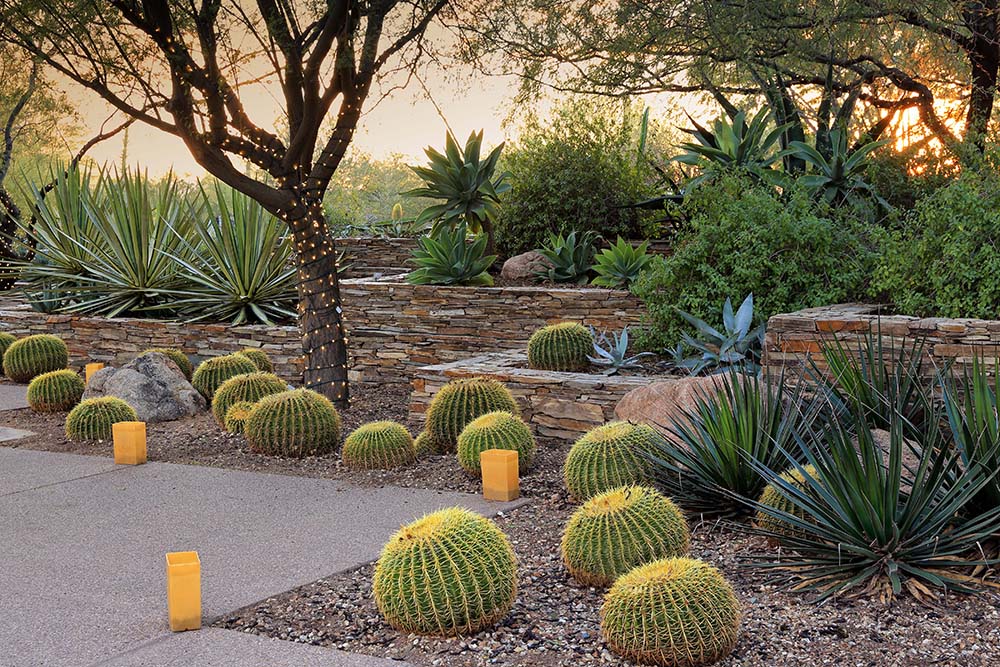Cacti, with their unique shapes and low maintenance, have captivated garden enthusiasts worldwide. In this post, we’ll explore how you can create your own cactus garden, transforming your outdoor space into a captivating desert landscape.
Cacti thrive in dry environments, making them perfect for sunny, arid areas of your garden. They come in various sizes and forms, offering endless possibilities for garden design. Knowing their desert origins helps in creating an authentic and thriving garden.
When selecting a location for your cactus garden, sunlight is key. Cacti thrive in bright, direct light, so a south-facing spot is ideal. Consider the sun’s trajectory throughout the day and how it interacts with other structures in your garden, like walls or large trees, which might cast shade. Good drainage is crucial to prevent root rot, a common issue in cacti. If your soil is heavy or clay-like, consider raising your garden bed or mixing in sand and gravel to improve drainage.
The layout of your cactus garden should reflect a balance between aesthetic appeal and the growth needs of the plants. For dynamic visual interest, use a columnar cactus-like Mexican Fence Post or San Pedro Cactus as focal points. Smaller species, such as Bunny Ear or Golden Barrel cacti, can be used to fill in the spaces and create a textured look. Consider the mature size of each cactus and provide enough space for growth. Play with the shadows that your cacti will cast, especially in the late afternoon, to add an intriguing dimension to your garden.
Mix different cacti types for variety. Include both large, statement cacti and smaller species. Adding succulents like aloe or agave can introduce contrasting textures.
Minimalist: Focus on simplicity. Use a few types of cacti in a spacious layout.
Rock Garden: Combine cacti with various rocks for a natural desert feel.
Color-Themed: Group cacti and succulents by color for visual impact.
Container Gardens: Ideal for small spaces. Use pots of different sizes and heights.
Cacti require soil that drains quickly. Use a commercial cactus mix or make your own by combining potting soil with coarse sand and perlite or pumice in a 1:1:1 ratio. This will ensure that water doesn’t linger around the roots, which can cause rot.
When planting, wear thick gloves to protect your hands from thorns. Dig a hole as deep as the root ball and twice as wide. Place the cactus in the hole and backfill it with soil, gently tamping down to eliminate air pockets. Avoid burying the cactus too deep to prevent stem rot.
Cacti need more water during the growing season (spring and summer) and less during dormancy (fall and winter). Water when the top inch of soil feels dry. Avoid overhead watering to prevent moisture accumulation on the cactus itself, which can lead to rot or fungal diseases. We highly recommend purchasing a moisture meter and water thoroughly when it is on the drier side.
Enhancing your cactus garden with non-plant elements not only adds visual interest but also helps to create a complete landscape. Decorative rocks or gravel can complement the desert theme. Arrange stones of various sizes and colors to create a naturalistic look. Garden sculptures or art pieces can serve as focal points and give your garden a personal touch. Consider the use of lighting to highlight certain plants or features and to create a dramatic effect at night.
When looking for inspiration, renowned cactus gardens can provide plenty of ideas. Observe how these gardens use space, mix plant varieties, and incorporate different heights and textures. Pay attention to how they manage practical aspects like pathways for maintenance and viewing. Gardens such as the Desert Botanical Garden in Phoenix or the Huntington Desert Garden in California showcase diverse ways of arranging cacti and using decorative elements effectively.
Now you’re equipped with the knowledge to start your cactus garden. Remember, cactus gardening is about experimenting and enjoying the process. And if you need cacti or advice, Ponderosa Cactus is here to help. Happy gardening!
